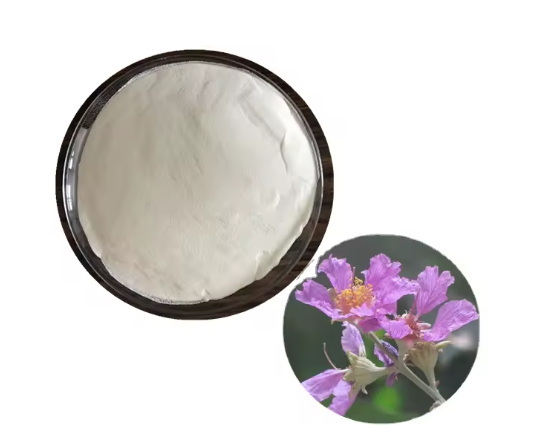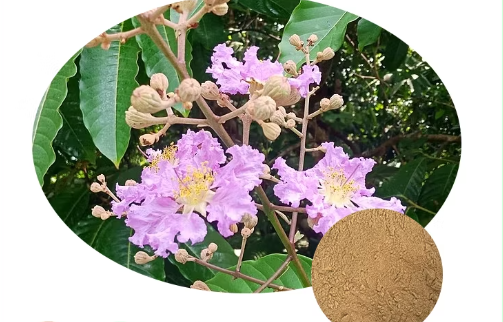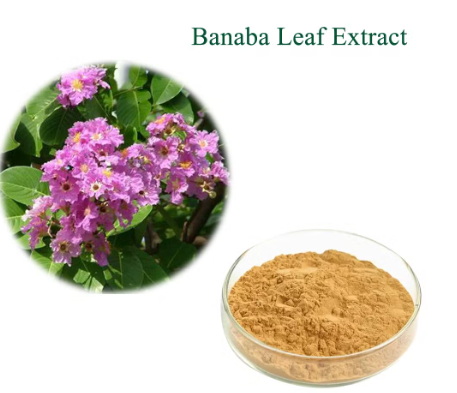Content Menu
● Introduction to Banaba Leaf
>> Benefits of Banaba Leaf for Blood Sugar Control
● Mechanisms of Action
>> Antioxidant and Antiviral Properties
● Custom Banaba Leaf Extract: Formulation and Dosage
>> Combination Therapies
● Clinical Evidence and Safety
>> Safety Profile
● Metabolic Syndrome and Banaba Leaf
● Potential Benefits Beyond Blood Sugar Control
>> Weight Management
>> Cardiovascular Health
>> Neuroprotective Effects
● Integration into Modern Healthcare
● Future Research Directions
● Conclusion
● Frequently Asked Questions
>> 1. What is the primary active compound in Banaba leaf responsible for its blood sugar control benefits?
>> 2. How does Banaba leaf extract enhance glucose uptake in cells?
>> 3. Can Banaba leaf extract be used in combination with other natural supplements for better blood sugar control?
>> 4. What are the potential side effects of using Banaba leaf extract?
>> 5. Is Banaba leaf extract safe for long-term use?
● Citations:
Banaba leaf, derived from the Lagerstroemia speciosa tree, has been used for centuries in traditional medicine, particularly in Southeast Asia, for its potent health benefits. One of its most notable uses is in managing blood sugar levels, making it a valuable component in the management of diabetes. Custom Banaba leaf extract, standardized to contain specific concentrations of active compounds like corosolic acid, has been shown to enhance blood sugar control through several mechanisms.

Introduction to Banaba Leaf
Banaba leaf is renowned for its ability to regulate blood sugar levels, primarily due to the presence of corosolic acid, a compound that mimics insulin by facilitating the movement of glucose from the bloodstream into cells. This natural insulin-like activity helps reduce insulin resistance, making it easier for glucose to enter cells where it can be used for energy production.
Benefits of Banaba Leaf for Blood Sugar Control
1. Reduces Insulin Resistance: Corosolic acid in Banaba leaf enhances the body's response to insulin, allowing glucose to move more efficiently into cells.
2. Enhances GLUT4 Protein Activity: GLUT4 proteins are crucial for glucose transport into cells. Banaba leaf extract increases their activity, further improving glucose uptake.
3. Decreases Liver Glucose Production: By inhibiting gluconeogenesis, Banaba leaf helps lower blood sugar levels by reducing the liver's glucose output.
4. Inhibits Alpha-Glucosidase: This enzyme breaks down starches into glucose. Inhibiting it reduces the amount of glucose entering the bloodstream from digested carbohydrates.
Mechanisms of Action
Custom Banaba leaf extract works through multiple mechanisms to support blood sugar control:
- Enhanced Cellular Uptake of Glucose: Corosolic acid promotes the uptake of glucose by cells, reducing blood glucose levels.
- Impaired Hydrolysis of Sucrose and Starches: By inhibiting enzymes like alpha-glucosidase, it slows down the breakdown of complex carbohydrates into glucose.
- Decreased Gluconeogenesis: Reduces the liver's production of glucose, contributing to lower blood sugar levels.
Antioxidant and Antiviral Properties
In addition to its effects on blood sugar, Banaba leaf exhibits antioxidant and antiviral activities. Its extracts have shown radical scavenging activity and the ability to inhibit lipid peroxidation. These properties can help protect against oxidative stress and viral infections, which are often associated with chronic diseases like diabetes.
Custom Banaba Leaf Extract: Formulation and Dosage
Custom Banaba leaf extract is often standardized to contain a specific percentage of corosolic acid, typically around 18%. The recommended dosage varies but is commonly around 48 mg per day, taken in divided doses before meals to enhance glucose uptake during digestion.
Combination Therapies
Banaba leaf extract is sometimes combined with other natural compounds like berberine, chromium, and curcumin to enhance its effects on blood sugar control. These combinations have shown promising results in clinical trials, offering improved glucose tolerance and reduced fasting blood glucose levels without causing hypoglycemia.
Clinical Evidence and Safety
While Banaba leaf has been used traditionally for diabetes management, modern clinical trials have provided evidence of its efficacy. A small clinical trial demonstrated a significant reduction in fasting blood glucose levels in patients with type 2 diabetes who received Banaba leaf extract. Another study showed improvements in glucose tolerance and glycated albumin over a year.
Safety Profile
Banaba leaf extract is generally well-tolerated, with minimal side effects reported. However, gastrointestinal symptoms like loose stools have been noted in some studies. No adverse effects have been observed in controlled human clinical trials, making it a safe adjunctive treatment for diabetes management.

Metabolic Syndrome and Banaba Leaf
Banaba leaf extract has also been studied for its potential benefits in managing metabolic syndrome, a cluster of conditions that increase the risk of developing type 2 diabetes and cardiovascular disease. A clinical trial found significant improvements in waist circumference, systolic blood pressure, and triglyceride levels, with two-thirds of participants achieving remission from metabolic syndrome.
Potential Benefits Beyond Blood Sugar Control
Weight Management
Banaba leaf extract may also aid in weight management by reducing body fat. Its ability to inhibit the absorption of dietary fats and enhance fat metabolism contributes to weight loss efforts.
Cardiovascular Health
The antioxidant properties of Banaba leaf can help protect against cardiovascular diseases by reducing oxidative stress and inflammation in the body. This protective effect is crucial for individuals with diabetes, who are at higher risk of cardiovascular complications.
Neuroprotective Effects
Some studies suggest that Banaba leaf extract may have neuroprotective properties, potentially helping to prevent or manage neurodegenerative diseases like Alzheimer's and Parkinson's.
Integration into Modern Healthcare
As interest in natural and holistic approaches to health grows, custom Banaba leaf extract is becoming increasingly recognized as a valuable adjunct to conventional diabetes treatments. Its safety profile and efficacy make it an attractive option for those seeking to manage their blood sugar levels naturally.
Future Research Directions
Future studies should focus on larger clinical trials to confirm the efficacy of Banaba leaf extract in diverse populations and explore its potential synergies with other natural compounds. Additionally, research into its effects on other metabolic disorders could uncover broader applications for this traditional remedy.
Conclusion
Custom Banaba leaf extract offers a promising natural approach to supporting blood sugar control. Its active compounds, particularly corosolic acid, work synergistically to enhance insulin sensitivity, reduce glucose production, and inhibit carbohydrate breakdown. While more extensive clinical trials are needed to fully establish its efficacy, existing evidence supports its use as a complementary therapy for managing diabetes and metabolic syndrome.

Frequently Asked Questions
1. What is the primary active compound in Banaba leaf responsible for its blood sugar control benefits?
- Answer: The primary active compound is corosolic acid, which mimics insulin to facilitate glucose uptake by cells.
2. How does Banaba leaf extract enhance glucose uptake in cells?
- Answer: It enhances the activity of GLUT4 proteins, which are involved in glucose transport into cells.
3. Can Banaba leaf extract be used in combination with other natural supplements for better blood sugar control?
- Answer: Yes, it is often combined with berberine, chromium, and curcumin to enhance its effects.
4. What are the potential side effects of using Banaba leaf extract?
- Answer: Common side effects are minimal but may include gastrointestinal symptoms like loose stools.
5. Is Banaba leaf extract safe for long-term use?
- Answer: It is generally considered safe and well-tolerated, even in larger doses, with no reported adverse effects in clinical trials.
Citations:
[1] https://naturmedscientific.com/banaba-leaf/
[2] https://www.drugs.com/npp/banaba.html
[3] https://www.healthydirections.com/articles/dr-whitaker-articles/banaba-leaf-blood-sugar
[4] https://supplements.selfdecode.com/blog/banaba-leaf-benefits/
[5] https://pubmed.ncbi.nlm.nih.gov/22095937/
[6] https://patents.google.com/patent/JPH05310587A/en
[7] https://pmc.ncbi.nlm.nih.gov/articles/PMC3468018/
[8] https://www.liebertpub.com/doi/pdfplus/10.1089/jmf.2021.0039






























